Local
D.C. shelter accused of rejecting trans women
Lawsuit, human rights office complaint filed against facility near U.S. Capitol
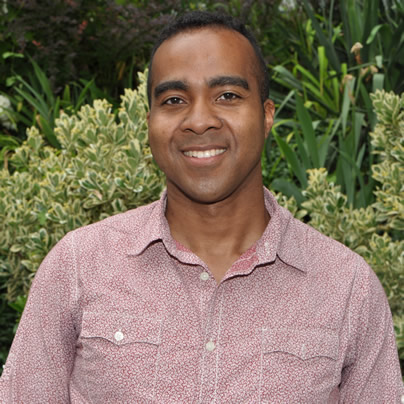
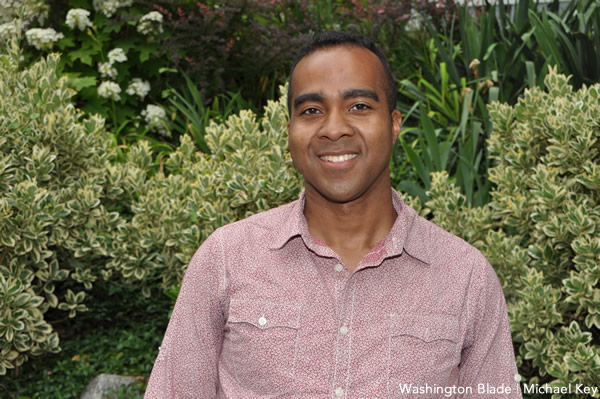
Sterling Washington, director of the Mayor’s Office of GLBT Affairs, told the director of a D.C. shelter for homeless women that refusing to admit transgender women violates the D.C. Human Rights Act, according to a lawsuit. (Washington Blade photo by Michael Key)
A shelter for homeless women located three blocks from the U.S. Capitol is violating the D.C. Human Rights Act by refusing to admit transgender women unless they provide “documentation” of a legal name change or gender reassignment surgery, according to separate complaints against the facility by two transgender women.
In a lawsuit filed April 5 in D.C. Superior Court and a complaint filed with the D.C. Office of Human Rights on March 22, the two women charge that employees at the John L. Young Women’s Shelter at 119 D Street, N.W. said they could not be admitted because of their status as transgender women.
An attorney with the D.C. Trans Coalition filed the lawsuit on behalf of Lakiesha Washington against New Hope Ministries, Inc. of Woodbridge, Va., which operates the John L. Young Women’s Shelter under a city funded contract.
The lawsuit says Washington, who was homeless, attempted to gain admission to the shelter on April 3, when the lawsuit says the alleged discriminatory action took place.
An unidentified female employee at the shelter asked Washington, “Are you a woman or a man,” the lawsuit says. “Ms. Washington replied, ‘I’m a transgender woman.’ The employee then asked Ms. Washington if she had any documentation, to which Ms. Washington replied that she did not.”
The lawsuit says the employee then told Washington, “We don’t do transgenders here. You have to leave.”
In a separate discrimination complaint filed with the Office of Human Rights, D.C. Trans Coalition member Andy Bowen says a shelter employee provided more details when Bowen asked about the facility’s policy regarding transgender women in a Feb. 5 phone conversation.
“The respondent stated that I would need to provide proof of a sex change,” Bowen said in her complaint with the OHR. “When I asked what would constitute proof, respondent answered that I would need to furnish documents of a name change or proof of surgery.”
Bowen told the Blade on Monday that she initiated her phone call to the shelter after learning that the John Young Shelter “has a history of refusing service to transgender women.”
John Shetterly, executive director of New Hope Ministries, told the Blade on Monday that he was looking into the allegations in the lawsuit and the OHR complaint and would be able to provide the shelter’s assessment of what happened within days.
The lawsuit states that Sterling Washington, director of the Mayor’s Office of GLBT Affairs, contacted Shetterly by phone on March 18, more than two weeks before Lakiesha Washington was refused entry to the Young Shelter. It says Sterling Washington informed Shetterly of reports he received that the shelter was refusing services to transgender women.
The lawsuit says Sterling Washington told Shetterly that the shelter’s action violated the D.C. Human Rights Act, which bans discrimination based, among other things, on gender identity and expression.
“Nevertheless, Mr. Shetterly did not take action to bring John L. Young into compliance with the law, and Ms. Washington suffered injury as a result,” the suit says.
The lawsuit calls on the court to “[t]emporarily, preliminarily, and permanently enjoin defendant…from continuing to discriminate against transgender women.” It also calls for the court to order New Hope Ministries to pay a civil penalty to the city’s general fund and to grant the plaintiff an award of attorney’s fees and other expenses associated with the litigation.
Court records show the court has scheduled a hearing on April 12 to consider a motion filed on Washington’s behalf by attorney Jeffrey Light for a temporary restraining order to force the Young Shelter to stop refusing admission to transgender women while the lawsuit is pending.
Elliot Imse, a spokesperson for the D.C. Office of Human Rights, said the office would have to make a legal determination on whether New Hope Ministries is exempt from the Human Rights Act based on its religious status before the office can begin to review the case on the merits.
The Human Rights Act provides an exemption, under certain circumstances, to religious organizations that allows them to limit “employment, or admission to” the organization based on religious beliefs.
In its most recent IRS 990 report released to the public, which covers the period of July 1, 2010 to June 30, 2011, New Hope Ministries says it generated $1.25 million in revenue and incurred $918,015 in expenses. The report shows that $817,509 of its revenue came from “government grants.”
The report doesn’t say from which government entity the grant money came. The Blade has made inquiries with New Hope Ministries, the Office of Mayor Vincent Gray, and the D.C. Office of Partnerships and Grants Services to determine if any of the grants came from the D.C. government. Officials with those offices couldn’t immediately be reached.
District of Columbia
Sold-out crowd turns out for 10th annual Caps Pride night
Gay Men’s Chorus soloist sings National Anthem, draws cheers
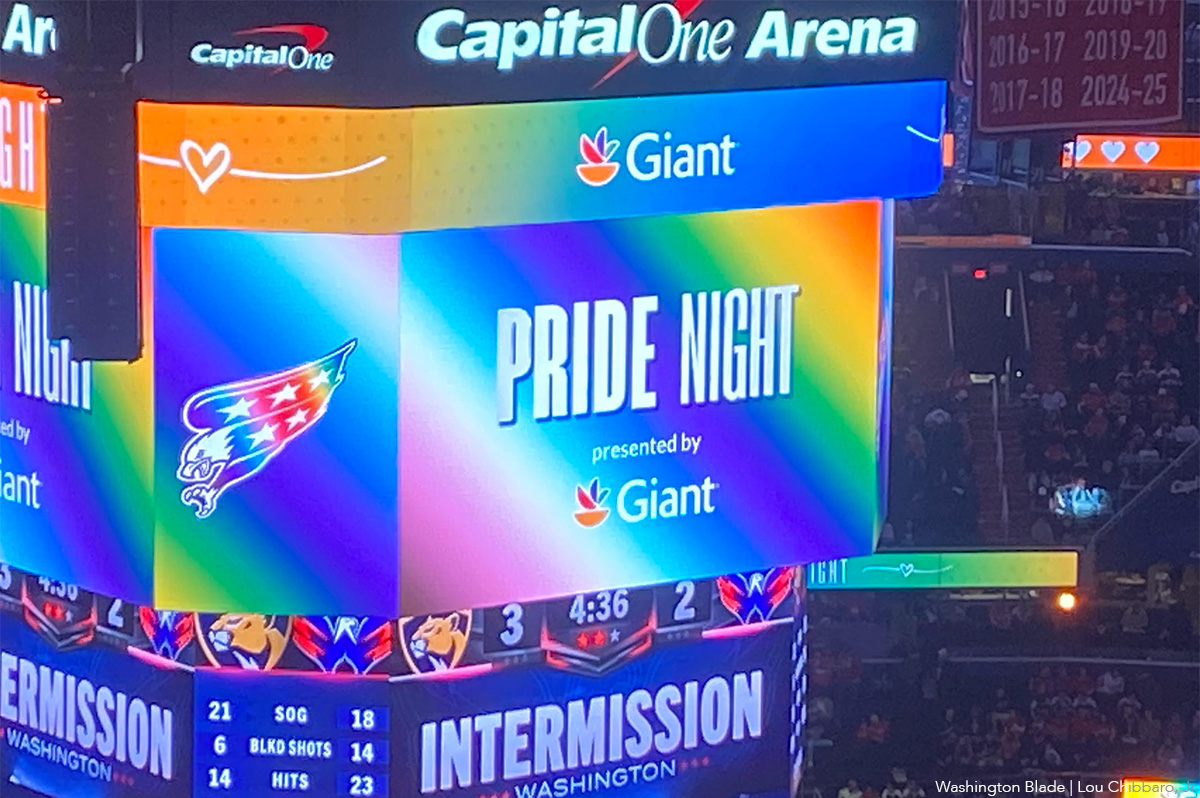
A sold-out crowd of 18,347 turned out on Jan. 17 for the 10th annual Pride Night at the Washington Capitals hockey game held at D.C.’s Capital One Arena.
Although LGBTQ Capitals fans were disappointed that the Capitals lost the game to the visiting Florida Panthers, they were treated to a night of celebration with Pride-related videos showing supportive Capitals players and fans projected on the arena’s giant video screen throughout the game.
The game began when Dana Nearing, a member of the Gay Men’s Chorus of Washington, sang the National Anthem, drawing applause from all attendees.
The event also served as a fundraiser for the LGBTQ groups Wanda Alston Foundation, which provides housing services to homeless LGBTQ youth, and You Can Play, a nonprofit organization dedicated to advancing LGBTQ inclusion in sports.
“Amid the queer community’s growing love affair with hockey, I’m incredibly honored and proud to see our hometown Capitals continue to celebrate queer joy in such a visible and meaningful way,” said Alston Foundation Executive Director Cesar Toledo.
Capitals spokesperson Nick Grossman said a fundraising raffle held during the game raised $14,760 for You Can Play. He said a fundraising auction for the Alston Foundation organized by the Capitals and its related Monumental Sports and Entertainment Foundation would continue until Thursday, Jan. 22

A statement on the Capitals website says among the items being sold in the auction were autographed Capitals player hockey sticks with rainbow-colored Pride tape wrapped around them, which Capitals players used in their pre-game practice on the ice.
Although several hundred people turned out for a pre-game Pride “block party” at the District E restaurant and bar located next to the Capital One Arena, it couldn’t immediately be determined how many Pride night special tickets for the game were sold.
“While we don’t disclose specific figures related to special ticket offers, we were proud to host our 10th Pride night and celebrate the LGBTQ+ community,” Capitals spokesperson Grossman told the Washington Blade.
Virginia
Two gay candidates running in ‘firehouse’ Va. House of Delegates primary in Alexandria
Kirk McPike, Gregory Darrall hope to succeed delegate vying for Ebbin’s seat

Gay Alexandria City Council member Kirk McPike and gay public school teacher Gregory Darrall, who serves as vice president of the Fairfax County Federation of Teachers, are among four candidates running in a Jan. 20 “firehouse” Democratic primary for a seat in the Virginia House of Delegates.
With less than a week’s notice, Democratic Party officials in Alexandria called the primary to select a Democratic nominee to run in a Feb. 10 special election to fill the 5th House District seat being vacated by state Del. Elizabeth Bennett-Parker (D-Alexandria).
Bennett-Parker won the Democratic nomination for the Virginia Senate seat being vacated by gay state Sen. Adam Ebbin (D-Alexandria), who is resigning from the seat to take a position in the administration of Democratic Virginia Gov. Abigail Spanberger, who took office on Jan. 17.
Bennett-Parker won the nomination for the state Senate seat in yet another firehouse primary on Jan. 13 in which she defeated three other candidates, including gay former state Del. Mark Levine.
The Jan. 20 primary in which McPike and Darrall are competing will take place from 8:30 a.m. to 7 p.m. in two polling places in Alexandria: the Charles E. Beatley Jr. Central Library at 5005 Duke St. and the Charles Houston Recreation Center at 901 Wythe St.
The other two candidates running are former Alexandria City School Board member Eileen Cassidy Rivera and criminal law defense attorney Chris Leibig.
McPike, who first won election to the Alexandria City Council in 2021, served for 13 years as chief of staff for gay U.S. Rep. Mark Takano (D-Calif.) prior to winning election to the Alexandria City Council.
“Now, Kirk is ready to bring his experience to Richmond to keep improving the lives of all Virginians as our delegate for House District 5,” his campaign website says. His website writeup says he and his husband, Cantor Jason Kaufman, have lived in Alexandria’s Seminary Hill neighborhood for 15 years.
“As delegate, we can count on Kirk to keep delivering for us — helping Virginia maintain our commitments to our schools, our first responders, and our efforts to address climate change, housing affordability, and infrastructure,” the website statement says.
McPike, a longtime LGBTQ rights supporter and advocate, has been endorsed by Ebbin and U.S. Rep. Don Beyer (D-Va.). Beyer said in a statement that McPike “has a proven track record of delivering results for Alexandrians.” The LGBTQ+ Victory Fund, which raises money for LGBTQ candidates running for public office, has also endorsed McPike.
Darrall’s campaign website says he is a “proud progressive, lifelong educator, and labor leader running to put people first.” It says he is a political newcomer “with more than 20 years in the classroom” as a teacher who played a key role in the successful unionization of Fairfax Public Schools.
“He is a proud member and staunch supporter of the LGBTQIA+ community,” his website statement says. It says he met his husband Jose while living in Miami and the two operated a small business in South Florida for a decade before moving to Alexandria in 2015. It adds that Darrall is “fluent in Spanish, loves walking Alexandria’s neighborhoods, and is driven by a deep belief in fairness, equality, and strengthening our democracy from the ground up.”
The Alexandria Republican City Committee nominated local business executive Mason Butler as the Republican nominee for the House of Delegates seat in the Feb. 10 special election after he emerged as the only GOP candidate running for the seat, according to the Alexandria Brief publication. He will face the Democratic winner in the Jan. 20 firehouse primary.
“As Delegate for House District 5, I will be a fierce advocate for LGBT equality in the Virginia General Assembly,” Rivera stated. She praised Spanberger for signing an LGBTQ-supportive executive order on her first day in office.
Rivera added, “I will fight alongside her to restore and enforce the Virginia Values Act, advance marriage equality, and ensure robust nondiscrimination protections in housing, employment, healthcare, and public accommodations.”
In his own statement, Leibig said, “I am as strong a supporter for LGBTQ rights as you can get.” Noting his role as a defense attorney specializing in criminal law, he added, “I regularly get calls from outside the commonwealth about defending trans people in situations where they are being treated terribly.”
He noted he was among the attorneys working on the first lawsuit against the Bureau of Prisons in support of “gender reaffirming surgery for an inmate.” He said he represented transgender former U.S. Army soldier Chelsea Manning in 2019 and was among those advocating for improved conditions for trans people in prisons.
“People of this community can count on me to support this community,” he said in referring to the LGBTQ community.
The Washington Blade couldn’t immediately reach GOP candidate Butler, who is running in the Feb. 10 special election but not in the Jan. 20 firehouse primary.
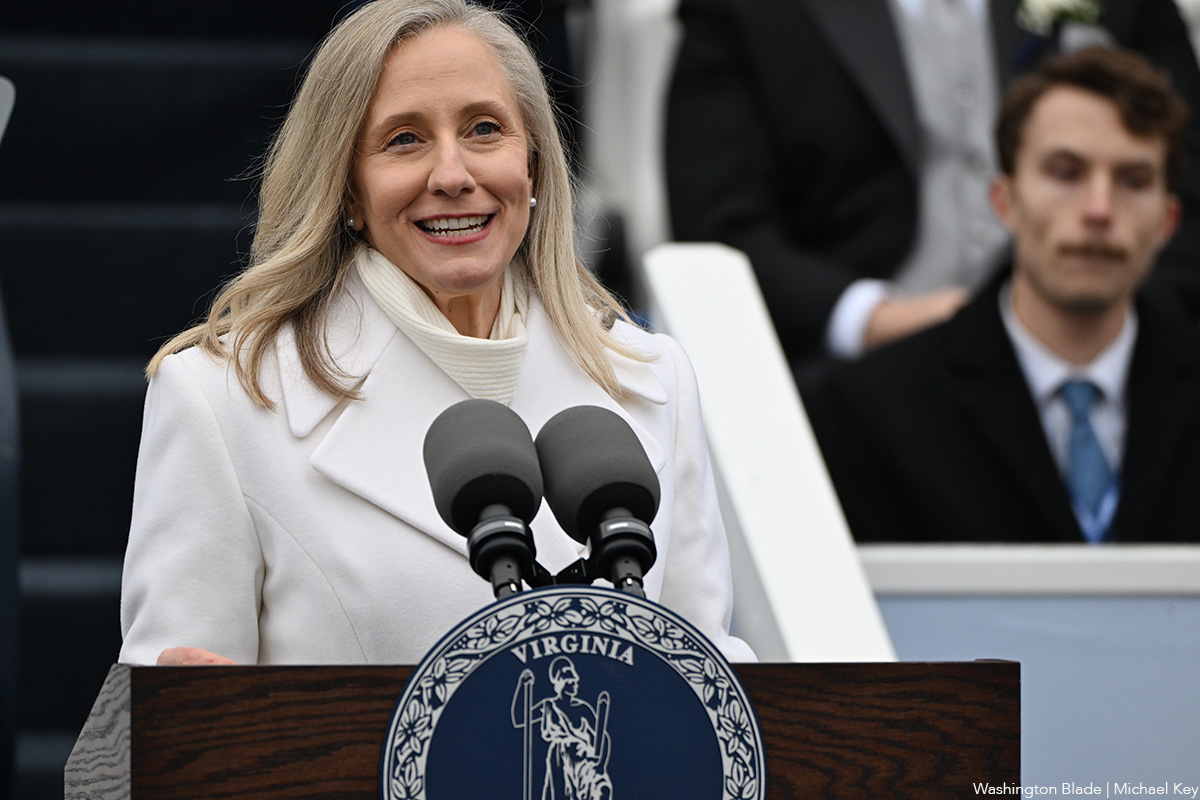
Abigail Spanberger was sworn in as the 75th governor of Virginia at a ceremony on the grounds of the Virginia State Capitol on Saturday. Thousands of spectators watched the swearing-in ceremony and parade, despite the rain and temperatures in the low 40s.
Spanberger, a member of the Democratic Party and an LGBTQ ally, became the first woman to be Virginia’s governor.
View on Threads
Newly-elected Attorney General Jay Jones, Lt. Gov. Ghazala Hashmi, and Spanberger were each administered the oath of office in the public ceremony.
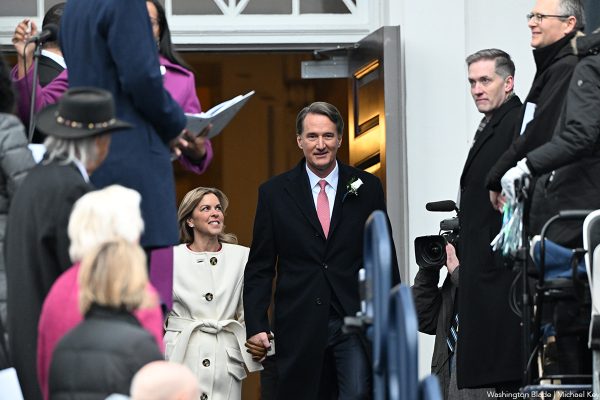
Republican former Gov. Glenn Youngkin left the ceremony shortly after the oath of office was administered to Spanberger and before the inaugural address.
In her speech, the new governor made an appeal to bipartisanship and looking past division in our current moment.
“To my friends in the General Assembly — on both sides of the aisle — I look forward to working with you,” said Spanberger. “I know what it means to represent your constituents, to work hard for your district, and to pursue policies you believe in. We will not agree on everything, but I speak from personal experience when I say that we do not have to see eye-to-eye on every issue in order to stand shoulder-to-shoulder on others.”
Spanberger acknowledged Virginians’ frustrations with federal layoffs and governmental policy.
“I know many of you are worried about the recklessness coming out of Washington. You are worried about policies that are hurting our communities — cutting healthcare access, imperiling rural hospitals, and driving up costs,” said Spanberger. “You are worried about Washington policies that are closing off markets, hurting innovation and private industry, and attacking those who have devoted their lives to public service.”
Spanberger alluded to the Trump administration, though never mentioned President Donald Trump’s name in her remarks.
Spanberger said, “you are worried about an administration that is gilding buildings while schools crumble, breaking the social safety net, and sowing fear across our communities, betraying the values of who we are as Americans, the very values we celebrate here on these steps.”
The new governor then spoke of her priorities in office, pledging to tackle housing affordability by working to “cut red tape” and increase housing supply. Spanberger also spoke of forestalling an impending healthcare crisis by protecting access and cracking down on “middlemen who are driving up drug prices.”
Spanberger spoke of investments in education at every level, standing up for workers (including the large number of federal workers in Virginia), and taking action on gun violence.
Virginia married couple Mary Townley and Carol Schall witnessed the inauguration ceremony from the stands set up on the grounds of the Capitol. Schall and Townley are one of the plaintiff couples in the case that challenged the Virginia constitutional ban on same-sex marriage.
Same-sex marriage became legal in Virginia in 2014.
“We are delighted with the inauguration of Abigail Spanberger as governor of Virginia,” Schall told the Washington Blade. “The celebration of her inauguration was full of the beautiful diversity that is Virginia. The Virginia Pride contingent was included as a part of what makes Virginia a great place to live.”
“Such an honor to attend such a wonderful event in Virginia history,” Townley told the Blade. “The weather before the Inauguration was cold and rainy, but I believe it represented the end of a dreary time and it ushered in the dry and sunny weather by the end of the inaugural parade. Madam Governor brought us to the light!”
The inaugural parade following the governor’s remarks included a contingent from Diversity Richmond and Virginia Pride. Marchers in the LGBTQ contingent carried a giant Progress Pride flag and were met with loud cheers from the gathered spectators.

Spanberger after her inauguration signed 10 executive orders. One of them bans discrimination against state employees based on sexual orientation, gender identity, and other factors.
“By virtue of the authority vested in me as Governor under Article V of the Constitution of
Virginia, I hereby declare that it is the firm and unwavering policy of the Commonwealth of Virginia to ensure equal opportunity in all facets of state government,” reads the executive order. “The foundational tenet of this executive order is premised upon a steadfast commitment to foster a culture of inclusion, diversity, and mutual respect for all Virginians.”


















